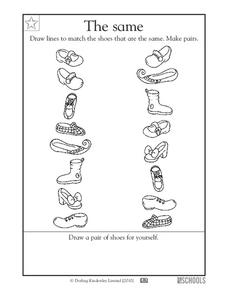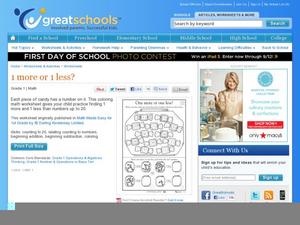Biology Junction
Cells and Their Organelles
This series of handouts and images asks young scientists to read short informational paragraphs, answer identification questions, and color and label diagrams of animal and plant cells. This is a complete resource that could be given as...
Ask a Biologist
Desert Tortoise
The desert tortoise is a protected species, and it's population in some areas, such as Joshua Tree State Park in California, has been rapidly declining over the years. Invite your young biologists to study the Desert Tortoise with this...
Curated OER
Drawing Curvy Lines
Can your youngsters trace a curvy line? Have them guide their pencil over part of a loop, then finish the line on the right side of the page. They can fill the rest of the page with their own curvy lines. A great way to work on fine...
Curated OER
Which One's Different?
One of these things is not like the others! Preschoolers identify which sock and glove is different from the rest, and draw a ring around the outlier. Then, they draw a sock and glove that are different from given pictures. Color the...
Curated OER
Complete the Picture: Snakes!
Those sneaky snakes are climbing up the trees - but they need someone to trace them! Preschoolers practice tracing curvy lines, and can color the snakes and trees when they're finished. A great way to practice tracing lines, and prepare...
Curated OER
10 More or 10 Less?
Take a rocket to the stars with using a math worksheet. Here, four sets of alien saucers, moons, rockets, and stars prompt young learners to match numbers with one more or ten more. Color the pictures for extra fun when learners are...
Curated OER
Farm Animal Cut and Paste
Let's practice cutting and pasting! Kindergarteners color four farm animals and then cut out the back half of the animals and paste them on the correct front half. Farm animal names are included to help improve sight word recognition...
Curated OER
Identifying Patterns
What's the pattern? Youngsters examine four sets of sequential images to detect a pattern and continue it onto a fourth image. Ask them to verbalize what they noticed and how they continued this pattern. Consider extending the concept...
Curated OER
The Same
Which shoes match? This is surely an activity your preschoolers do daily, so use it in an educational way. They match shoes to make pairs, connecting the matches with a line. There are eight pairs in all. Next, youngsters get to draw a...
Curated OER
Long, Longer, Longest
This worm might be long, but can scholars draw an even longer worm? Focus on relative size as they draw a longer worm and then a longer necklace. Next, youngsters examine two sets of objects and check off the longest in an introduction...
Curated OER
Hopping by 2s
Hop to it! Young counters practice skip counting by two using illustrations of animals hopping from place to place. Each image shows a number sequence and scholars draw in the path as they move from number to number. Encourage them to...
Curated OER
The Maze
There's only one way out of this maze, and youngsters will need to use their shape recognition skills to do it! They follow a three-shape pattern all the way from start to finish to keep on track. Encourage them to say the shapes as they...
Curated OER
One More or One Less?
Hook new mathematicians with a candy-themed approach to addition and subtraction. They examine 10 numbers (not exceeding 19) printed on candy wrappers. For each, learners calculate and record numbers with values one more and one...
Curated OER
Reading Numbers
Teach number value to 20 through sets of objects. Young pupils use the number given for each of the four sets to determine how many should be colored in. How many are left? There is an addition box that has been left blank so scholars...
Curated OER
Sorting the Animals
Does a fish have four legs? Of course not! Youngsters practice their counting (and animal attributes) skills as they determine which of each set of animals has a specified number of legs. They circle animals with four, six, two, and zero...
Curated OER
Play I Spy
If you're looking for a fun way to practice initial phonemes with emerging readers, look no further! They examine a farm scene to find things that begin with f, h, or g, writing the total number they found in a box beside each letter....
Curated OER
Halves
Is it half? There are three sections to this introductory fractions learning exercise focusing on halves. First graders begin by coloring half of five basic shapes, each of which already is divided into two parts. Next, they examine four...
Curated OER
Sets Of
Represent multiplication as sets of items for beginners to this concept. They look at six familiar object sets and determine the total number of legs by counting the sets. There is some scaffolding here, as the first is done for them and...
Curated OER
Symmetry
Do these dotted lines indicate symmetry? Some of them do, and scholars determine which ones in 12 different images. Because some of these are tricky, it may be helpful to have large versions of these shapes printed and cut out. This way,...
Curated OER
Fewer Than
Which one has fewer? There are three sets of pictures here for young counters who determine which has fewer of a given detail. They look at apples on trees, cupcakes on plates, and spots on dogs, checking off the one with fewer....
Curated OER
Patterns
Follow the pattern to find what comes next. Youngsters analyze shape patterns to continue the sequence in the provided space. The three patterns increase in difficulty, and then scholars have a chance to create two of their own....
Curated OER
What Shapes Can You See?
This clown is missing some things, and young counters sequence single-digit numbers to complete this juggling act. They connect four separate connect-the-dots sequences to create two triangles and two squares, then complete three more...
Curated OER
Values Practice Activity
How many values can one colored pencil create? This is the question your budding artists are going to find out. They choose three colored pencils, use the provided boxes to create a light-to-dark value strip, and then answer three...
Curated OER
Goldilocks and the Three Bears
Explore storyboards with your pre-reader using the familiar story "Goldilocks and the Three Bears." They look at pictures as you read the captions in a comic book style. At the end, they try to finish the story based on a resolution...

























